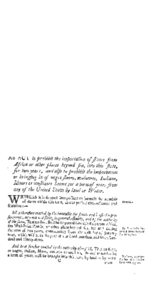Full Transcript
WHEREAS it is deemed inexpedient to increase the number of slaves within this state, in our present circumstances and situation:-
BE it therefore enacted by the honorable the senate and house of representatives, now met and sitting in general assembly, and by the authority of the same, That no slave shall be imported into this state from Africa, the West-India islands, or other place beyond the sea, for and during the term of two years, commencing from the first day of January next, which will be in the year of our Lord one thousand seven hundred and ninety-three.
And be it further enacted by the authority aforesaid, That no slave, or negro, Indian, Moor, mulatto or mestizo, bound to service for a term of years, shall be brought into this state, by land or by water from any of the United States, or any of the countries bordering thereon, ever hereafter. Provided nevertheless, That it shall and may be lawful for any citizen of the United States, coming to settle with his family in this state, from any of the United States, and actually settling in this state for five years, to bring along with him or her, all such slaves as he, she or they may possess, in his, her or their own right, or as guardian for any person removing with him, her or them; but no person shall be permitted under colour of such removal, to bring with him, her or them into this state for sale, the slave or slaves of any other person. And provided also, That if any citizen of this state shall intermarry with a citizen of another state, it shall and my be lawful for such citizen to bring into this state, all such slaves as he or they may actually and directly acquire by such intermarriage. And provided, nothing in this act contained, shall be construed to extend to the servants or domestics of persons travelling to and from, and into this state from any of the United States, or to the domestics of persons coming from any other place, and residing not more than six months in this state: but such servants or domestics shall, in such case be permitted to be sold or to remain in this state at the departure of their owners or masters.
And be it further enacted by the authority aforesaid, That if any slave or negroe, Indian, Moor, mullato or mustizoe, bound to service for a term of years, shall be imported or brought into this state, contrary to the true intent and meaning of this act, such slave or slaves negro, Indian, Moor, mulattoe or mustizoe, shall be deemed and taken as a forfeiture to the state, one third part of whose value shall be paid to the person or persons making information of such importation or bringing in; and the person or persons importing or bringing in such slave or slaves; negro, Indian, Moor, mulatto or mestizo, contrary to the intent and meaning of this act, shall moreover be subject to a penalty of fifty pounds for every slave or negro, Indian, Moor, mulatto, or mestizo so brought in.
And be it further enacted by the authority aforesaid, That where any person has knowledge of or sufficient grounds to believe that any slave or negro, Indian, Moor, mulatto or mustizoe has been imported or brought into this state, contrary to the true intent and meaning of this act, it shall and may be lawful for such person to make information thereof to a magistrate upon oath, who is hereby required and directed to issue his warrant against the person accused of such importation or bringing in; and who, upon hearing the informer and the person accused, may either discharge the accused, if he thinks there is no just cause of information or good grounds of suspicion, or if there appears sufficient cause of information, he shall forthwith take into safe keeping all the slaves, negroes, Indians, Moors, mulattoes or mustizoes, so imported or brought into this state contrary to this act, unless the party accused give ample security for redelivery of the same slave or slaves, Indian, Moor, negro, mulatto or mustizoe, if adjudged to be forfeited, and the said magistrate shall forthwith proceed to summon to his aid one other magistrate and three free holders, who shall hear the parties and adjudge thereon as to law and justice doth belong; and either if the informer or person accused, are dissatisfied with the judgment of the single magistrate, or the magistrates and freeholders, they shall be allowed an appeal from such judgement, to the next court of common pleas to be holden for the district where such trial has first been had, where the said appeal shall be tried before a jury of the country, without delay the judgement of which court shall be final conclusive.
In the Senate House, the twenty first day of December, in the year of our Lord one thousand seven hundred and ninety two, an in the seventeenth year of the Independence of the United States of America.
DAVID RAMSAY, President of the Senate.
JACOB READ, Speaker of the House of Representatives.
Date
Location
Citation
Download Original
Images published from the Gale's Eighteenth-Century Collections Online (ECCO) with permission of Gale. Further reproduction is prohibited without permission.
